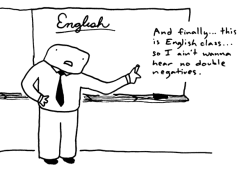Verbal Sparring 101: English proficiency is required
/I was in Subway yesterday, waiting patiently in line to order my roast beef on wheat, when the customer in front of me decided that it was time to act like a jerk. Dissatisfied with the number of cucumbers that had been placed upon his sandwich, he said, “What? You can’t give me no more cucumbers?” “Sure, no problem,” the employee responded, more patient than I could have ever been. Not only were his choice of words offensive, but his tone and demeanor screamed condescension.
A few moments later, when the amount of Southwest sauce was also inadequate in the customer’s estimation, he spoke up again. “What’s your problem? You can’t give me no more sauce?”
Again, the employee responded with a polite and apologetic tone.
When the customer reached for a cup and began filling it with Coke, the employee moved over to the register and asked, “Did you want the meal, sir?”
“What’s it look like?” Mr. Meany Pants shot back, shoving the cash into the employee’s hand.
In a situation like this, I would normally come to the defense of the employee, launching some type of verbal assault against the offender in hopes that bystanders might join my cause. They usually don’t, but I do manage to receive quite a few nods of appreciation in these types of situations, and that’s usually enough for me to press on.
I know that many might consider my potential involvement in this type of situation to be sticking my nose where it doesn’t belong, but I disagree. This type of behavior should never be tolerated. Unfortunately for the Subway employee, she was unable to defend herself without risking her job, so that is normally where we all must step in. Defending those who cannot defend themselves.
In this case, however, I restrained myself, adhering to one of my rules on verbal sparring:
Avoid verbal confrontations when your opponent lacks command of the English language.
Based upon his constant use of double-negatives, I doubted Mr. Meany Pants’s ability to converse effectively in English. In this type of situation, the nuances of my verbal sparring would be lost on the individual, resulting in an inarticulate, profanity-laced shouting match, with neither combatant gaining the upper hand.
The same rules apply when playing poker. Don’t check-raise a novice player, for example, because he or she won’t understand the meaning of a check-raise. When dealing with an amateur, play it straight or don’t play at all.
So rather than entering into battle with this man, I waited until he had left and then praised the employee for her cool-headedness and patience in the face of such despicable rudeness.
She seemed pleased.
This afternoon was an entirely different story.
Upon pulling into a parking space at Stop and Shop, I noted an older gentleman pulling his Buick alongside my car into one of those spots reserved for customers who are saddled with infants. Noting that this man was without infant, I jumped out of my car quickened my pace until I was walking beside him.
“You really shouldn’t keep kids in the trunk,” I said to him as we approached the doors.
“Huh?”
“I said that you really shouldn’t keep kids in the trunk of your car.”
“What?” the man asked, genuinely confused.
“Well, I noticed that you parked in the spot reserved for people with infants, and since I didn’t see a baby in your arms or in the car, I’m assuming that you put the poor little thing in the trunk.”
“Go to hell,” the man shot back, realization washing across his face. “Just go to goddamn hell.”
‘Don’t be too long!” I warned the man as he entered the store a couple steps ahead of me. “I’m just making a deposit at the bank, and there’s no telling what I may do once I leave the store, especially if I see a mother walking halfway across the lot with her baby!”
I’m not sure if he heard everything I said (I’m deeply saddened if he didn’t), but I was pretty loud and the man seemed genuinely embarrassed by my comments as he turned the corner, heading toward the produce aisle.
I know there will be some who will say that my remarks were just as rude as the man’s decision to park in the reserved spot. But again, I disagree. I believe that we have an obligation to stand up against these inconsiderate people, particularly when the victims of their inconsideration cannot defend themselves. And in this case, it’s even more difficult for these victims to stand up and defend themselves.
First, a person with an infant is significantly less likely to engage anyone in a verbal battle. Even I adhere to this rule when I’m with my children.
Second, these parents or babysitters would have no idea that this man had infringed upon their rights. Unless they actually saw him entering or exiting his Buick, they would see his car and likely assume that the driver was also accompanying an infant. Therefore they would never have the opportunity to challenge him.
Admittedly, I’m not always thinking of the victim when engaging in these confrontations. In fact, more often than not, I’m not thinking about the victims at all. I enjoy these verbal battles. I can’t imagine you how much satisfaction I get from a well-timed quip or a stinging barb. This afternoon’s confrontation with the old man was the highlight of my day. The way that guy went from confusion to outrage to embarrassment in less than minute was priceless.
I’ve had a skip in my step ever since.
Regardless of the reason for my attack, I believe that my remarks may have made a difference in the world. Even the most hardened skeptic must admit that the likelihood of that man parking his Buick in those reserved spots again is significantly reduced because of my interference. He will certainly think twice before doing so.
And as a result, a mother with an infant is more likely to find that reserved spot available when they arrive.
Sometimes the ends do justify the means.




